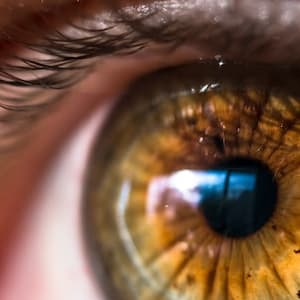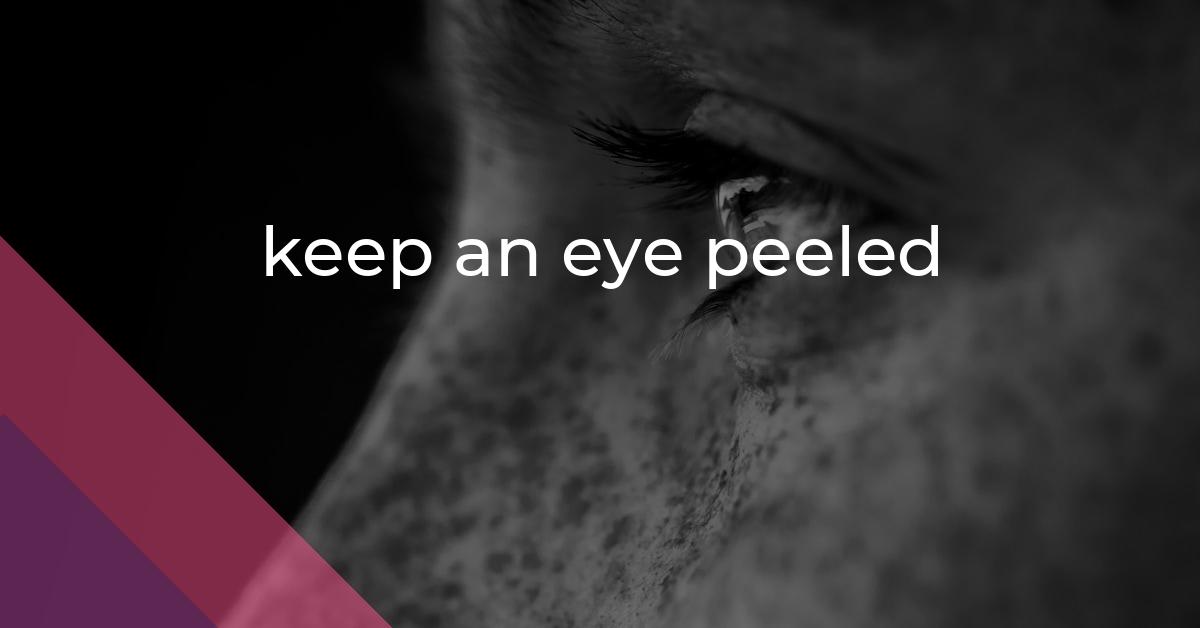keep an eye peeled: Idiom Meaning and Origin
What does ‘keep an eye peeled’ mean?
The idiom "keep an eye peeled" means to be vigilant or watchful, paying close attention to one's surroundings in order to notice any important or unusual developments.

Idiom Explorer
The idiom "watch out" means to be careful or vigilant, usually in order to avoid danger or potential harm. It is often used as a warning to someone to pay attention to their surroundings and be cautious.
The idiom "lay eyes on" means to see or look at something. It implies that the person looking at something has a strong desire or interest in it.
The idiom "keep watch" means to stay vigilant or be on the lookout for potential dangers or threats. It implies being aware and alert to ensure the safety or security of someone or something.
The idiom "keep a weather eye open" means to be vigilant or observant, particularly in regard to potential dangers or changes in circumstances.
The phrase "keep an eye out" means to be watchful or alert for something or someone, often with the aim of finding or noticing them. It is used to emphasize the importance of being observant and paying attention to one's surroundings.
The idiom "keep an eye open" means to remain alert or vigilant, to pay close attention to something or someone in order to avoid missing any important information or opportunities.
The idiom "keep an eye on" means to regularly and closely monitor or watch someone or something, usually to ensure their safety or to prevent any problems. It implies being observant and vigilant in order to maintain control or stay informed about the situation.
The idiom "keep a low profile" means to avoid attracting attention or publicity, and to remain inconspicuous or discreet in one's actions or behavior.
The idiom "keep a lid on" means to maintain control over something, especially to prevent it from becoming known or causing trouble.
The idiom "keep a close watch" means to closely monitor or observe something or someone, usually with the goal of ensuring their safety, security, or well-being.
Decoding Vigilance: Unveiling "Keep an Eye Peeled"
The idiom "keep an eye peeled" is widely used in the United States and means to be watchful or attentive. It can refer to being aware of one's surroundings or a particular situation. The phrase is commonly found in books, newspapers, movies, and everyday conversations, but its origin and exact time of first usage are uncertain.
One theory suggests that the idiom may have originated from the practice of comparing eyes to fruit, such as peeling the skin off an apple or banana to reveal the inside. This analogy may imply the need to remove a layer of protection in order to fully exercise one's vision or to stay vigilant. However, this theory cannot be verified.
Another speculation is that the idiom could have arisen from the action of carefully peeling the thin protective layer of skin covering the surface of one's eye. This act of peeling the eye might represent a heightened state of alertness as if one were actively removing physical impediments to their vision to focus more attentively on their surroundings.
Alternatively, the idiom may have originated from peeling back the skin around one's eyes to prevent sleepiness or fatigue. This interpretation emphasizes the importance of staying mentally alert and attentive to potential dangers or opportunities.
Despite these theories, the true origin and meaning of the idiom "keep an eye peeled" remain uncertain. Nevertheless, the phrase continues to be widely used and understood, appearing in various contexts such as novels, crime stories, and casual conversations.
Related idioms to "keep an eye peeled" include "keep an eye open," "keep an eye out," "keep an eye on," "keep watch," and "keep a weather eye open." Each of these idioms shares the common theme of vigilance or attentiveness.
"Keep an eye open" is used to advise someone to be watchful or attentive. It implies that one should stay aware of their surroundings or a particular situation. For example, a parent might tell their child to keep an eye open for approaching traffic while crossing the road.
"Keep an eye out" is similar to "keep an eye open" and means to be alert and watchful for something specific. It suggests actively looking for something. For instance, a hiker may be told to keep an eye out for trail markers to stay on the right path.
"Keep an eye on" is another related idiom that means to watch or monitor someone or something closely. It implies a sense of responsibility in maintaining awareness and surveillance. A supervisor might instruct their employee to keep an eye on a particular project or task.
"Keep watch" is an idiom that shares the same idea as "keep an eye on." It means to be vigilant and stay attentive to something or someone. It suggests the need for constant observation and alertness. For example, a security guard may keep watch over a building to ensure its safety.
"Keep a weather eye open" is a phrase that originates from nautical language. It means to be watchful and alert for any signs of changing weather conditions, which could impact the safety of a ship or crew. This idiom has since been adopted to convey the importance of staying vigilant in general. It implies the need to be aware of potential risks or changes in a situation. For instance, a business owner may keep a weather eye open for any economic shifts that could affect their industry.
Though the precise origin and etymology of the idiom "keep an eye peeled" may remain uncertain, its meaning in modern American English is clear: to maintain a state of vigilance. The idiom and its related expressions add color and imagery to our language, allowing us to convey the importance of staying watchful and attentive in various contexts. While we may not know the exact origins of these idioms, their continued usage and shared understanding among English speakers highlight their significance.
Example usage
Examples of how the idiom "keep an eye peeled" can be used in a sentence:
- I asked my friend to keep an eye peeled for any updates on the concert tickets.
- Please keep an eye peeled for any suspicious activity in the neighborhood.
- The detective kept an eye peeled for any clues that could help solve the mystery.
More "Vigilance" idioms



